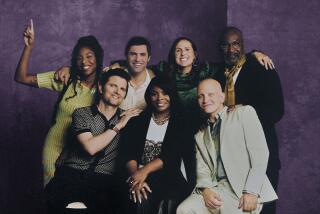Human Types : Secret of the Personality Game Is to Know Thyself
- Share via
The scene is a family argument. The actors are high school students. The costumes are colored T-shirts.
Father (in brown): I’m not letting him go to those parties where everyone’s drinking.
Sister (in green): Kids don’t drink more than adults do .
Father: Adults have reason to drink.
Son (in orange): So do kids. What about all the competition to make it on the team? What about girls?
Sister: Not to mention the breakup of the family. Or the bomb.
Father: You call those reasons? Answer me this: Do you have a job? Do you have to make house payments? Do you have teen-age children? No? Then you have no excuses for drinking.
Mother (in blue): An excuse is still an excuse whether it’s made by an adult or a child.
The repartee was part of a recent show at Ocean View High School in Huntington Beach. It was staged and co-written by students to make a serious point about alcohol. But their vehicle was “The Game of Games,” a humorous production about personality types.
Created by Newport Beach entrepreneur Don Lowry as a lesson in communications, the show has been performed at least 100 versions over the past five years for corporations, professional organizations and, most recently, schools.
Lowry’s basic script can be adapted to convey any organization’s message. But the underlying point is the same: People are fundamentally different, and they can resolve many personal problems by accepting and appreciating those differences.
“This information is so useful, people ought to know it,” said Lowry, explaining his zeal in promoting the show. “Everyone can be more successful and have more harmonious relationships by using whatever motivates them.”
In the show, actors portrays four personalities, which are identified by the color of their T-shirts. They reveal their values and idiosyncrasies through their reactions to familiar situations: falling in love, riding in a car pool, arguing over a toothpaste cap or responding to a friend’s offer of drugs or alcohol.
A former teacher and business executive, Lowry based “The Game of Games” on “Please Understand Me,” a book on personality types by David Keirsey, a clinical psychologist and former Cal State Fullerton professor. Opposing the Freudian idea that all people are driven by similar motives, theories of personality type assume that people are born with different drives. The Myers-Briggs Type indicator--a personality test that revived older temperament Carl Jung to Hippocrates--has been used in standard practice since the 1950s. Keirsey helped popularize the Jung-Myers concepts by creating a simpler test and elaborating on the results.
Before the show, viewers may participate by taking a short personality test that asks 17 questions, such as: “Are you more impressed by: a) principles or b) emotions?” Or, “Are you more frequently: a) an imaginative sort of person or b) a down-to-earth sort of person?” The totaled responses identify the participant as belonging to one of four personality types: intuitive feeling (NF or blue); sensing perception (SP or orange) and sensing judgment (SJ or brown).
Best of Conceptualizing According to Keirsey’s theory, NTs, such as the sister in the Ocean View show, are best at conceptualizing. They tend to be perfectionists, viewing life as something to be understood and explained and having a low tolerance for illogical or emotional thinking.
NFs, such as the mother, are communicators, highly idealistic seekers of the meaning of life. They are romantic, creative and people-oriented.
SPs, such as the son, thrive on fun, spontaneity and risk-taking. Witty and charming, they are bored with routine and structure.
SJs, such as the father, are responsible, practical and conservative. They believe in work before play and are often the backbone of any organization.
One in three respondents will mistype themselves due to lack of self-awareness, cautioned Keirsey.
Academic psychologists have shown little interest in personality types, said Keirsey, now retired and living in Del Mar. But 2,000 psychologists, educators and organizational experts belong to the Assn. of Psychological Type, a 7-year-old national organization. And there is a growing worldwide interest among management and marketing consultants, sales personnel and lawyers, he said. The Japanese particularly have been testing and placing corporate employees on a large scale since 1962, he said. Using personality type questionnaires, Lowry said, he also once helped select “blue” or intuitive feeling jury members for a lawyer defending a “blue” client.
Those who have commissioned versions of “The Game of Games” include the California Bar Assn., the Fluor Corp. and Knott’s Berry Farm Management Club. Lowry offers clients the basic script and services, including costumes, writers, a director and a troupe of a dozen professional and amateur actors--all enthusiasts of personality type theory. Clients who want to participate themselves may select the script and a director only. Fees range from $500 to $5,000, depending on which services are provided.
South Coast Repertory Over the past two years, Lowry’s own troupe has occasionally performed “The Game of Games” for general audiences at South Coast Repertory on off nights.
The show was never the same twice, said Leo Collin, operations manager at the South Coast Repertory. What the actors may have lacked in theatrical polish, they made up for in “heart and soul,” he said. One night, the audience became so involved in an exchange with the performers, “they could hardly get them to sit down,” he said.
The show’s message is deeper than pop psychology, said George Watson, a psychologist and past president of the Orange County Psychological Assn. Those who benefit most see what they already know about themselves validated on stage, he said. SPs, for example, may know they are playful but may consider themselves lazy and out of sync with the rest of the world. Through the show, Watson said, they will learn SPs are naturally restless, can be loved for their generosity and can succeed in work that allows them freedom. But those who come away with brand new insights about themselves may have overgeneralized the information, Watson cautioned.
He added: “The helpfulness of this kind of experience comes from follow-up. Without it, it’s Dr. Feel-good for several hours and then pretty much back to where you were before.”
However, Lowry, 48, said exposure to Keirsey’s personality type theory changed his life. Several years ago, he was co-owner and manager of a firm that sold computerized record-keeping systems to schools. Though successful, he was a perfectionist, insecure and had problems with employee productivity, lawsuits and a divorce. Then he read Keirsey’s book, “Please Understand Me.”
16 Personality Types The book breaks down the basic four temperaments into 16 personality types and 32 mixed types. In it, Lowry said, he found a description of himself--the ENTP (extro-version, intuition, thinking and perceiving). It explained, he said, why he had trouble communicating and what he could do best--improvise and innovate. He successfully applied his new awareness at work by marketing directly to teacher types and hiring types suited to their work. His personal life improved, he said, when he recognized his strongest relationships were with ENFP women (extroversion, intuition, feeling and perceiving)--those who were similarly extroverted, intuitive and perceiving but complemented his logical nature with a greater appreciation for feelings.
Then, five years ago, he left the firm as president to start Communication Companies International, which would develop and market Keirsey’s personality theory in entertainment and other forms.
Keirsey, who calls himself a “pure NT” scientist type, said he tried to discourage Lowry at first, fearing that “cartoon” skits about complex character types would distort the theory and end in disaster. Now, after seeing several productions of “The Game of Games,” he believes the humor in the show makes personality type accessible and intersting to people who might not care otherwise.
A self-described professional maverick, Keirsey believes the value of personality, or temperament theory, in counseling and education is enormous. “I’ve been watching improved communications and relationships for 25 years. Hundreds of counselors who graduated from Cal State Fullerton were completely hooked and enamored of the theory, and all of them are using it in their practice today.”
Keirsey said he encourages Lowry as much as possible, though he has no financial stake in the production, Lowry believes the production will be lucrative if he succeeds with plans to turn it into a television series, a sitcom or a movie. But so far, “The Game of Games” has not yet been profitable. Lowry said he has kept it going with funds from his record-keeping business.
With nonprofit groups such as schools, he splits proceeds from ticket sales. The Ocean View High School production, the second at the school since November, earned about $500 for the California Teen Project, the student arm of an anti-drinking -and-driving program. Because of the substantive message, Lowry considers the production his most significant.
Most important, according to school officials, are the multiple messages and “positive peer pressure” conveyed by the production. First, the students who chose and staged the play learn to value themselves and other people, said Carol Kanode, Ocean View student sponsor. In addition, members of the audience--students, friends and family--may have been impressed enough by the effort to listen to the messages. And, she hopes, any self-awareness inspired by the show will translate to more responsible personal behavior regarding alcohol and drugs. Assistant Principal George Clemens said parts of the show--especially scenes dealing with peer pressure--will be performed for every English class at the school next semester.
Both Keirsey and Lowry believe “The Game of Games” has the most value when performed for junior high and high school students. “It’s a high-risk time for one’s self-esteem,” Lowry said. “Kids are wanting to find their place, their talent and how they relate.” Schools offer one of the last chances for people to mingle with all different types, he said.
SPs, the artisans, particularly have trouble with school because its systematized curriculum offers them little encouragement, said Keirsey. By 12th grade, a significant percentage of SPs has dropped out of school, he said.
The point of teaching students personality type is not to weight them down with lifelong labels, Lowry said. Rather, they will learn early that “we have certain things we prefer to do, and we esteem ourselves by doing those things. Then, when they do to work with certain roles to play, they’ll find opportunities to succeed, be productive and have self-respect, even though they may be different.”
More to Read
The biggest entertainment stories
Get our big stories about Hollywood, film, television, music, arts, culture and more right in your inbox as soon as they publish.
You may occasionally receive promotional content from the Los Angeles Times.










